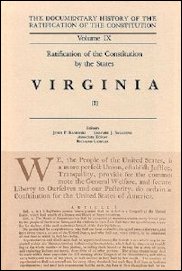Del. Tony O. Wilt, R-Harrisonburg, is sponsoring House Joint Resolution 513 to amend the Virginia Constitution to limit the duration of the governor’s executive orders during a state of emergency. The bill is written in a way that needlessly accepts the notion that the governor has broad, sweeping power beyond what the office is actually granted under the Constitution.
How can a proposed limitation of the duration of the Governor’s executive orders result in a grant of broad, sweeping powers? The answer is found by analyzing HJ Res. 513 in the context of other provisions of the Virginia Constitution.
The bill fails to take into consideration the following pertinent constitutional provisions:
- The General Assembly has legislative power. (Article IV, Section 1).
- The governor has executive power (Article V, Section 1).
- The courts have judicial power (Article VI, Section 1).
- The powers of the three branches are separate, and no branch can exercise powers of another branch. (Article III, Section 1).
- No one has the authority to suspend the laws without the consent of the representatives of the people. (Article I, Section 7).
The General Assembly has the authority to enact civil and criminal laws — subject to any constitutional limitations — which can restrict, limit, prohibit or otherwise regulate actions by individuals and businesses. But the legislature cannot constitutionally enact any law that: (1) gives the governor legislative authority; (2) disregards or circumvents any provision of the Constitution; or (3) gives the governor authority to disregard or circumvent any provision of the Constitution.
The governor has no authority under the Constitution to enact laws, suspend existing laws, or declare lawful conduct to be illegal. Nor can the governor execute the laws in a manner that would disregard or circumvent any provision of the Constitution.
Now consider the problematic language in HJ Res. 513, which would add a new Section 7-A to Article V of the Constitution: “The Governor shall have the powers and duties related to states of emergency as provided by general law, except any executive order related to such an emergency issued by him that restricts, limits, or prohibits otherwise lawful action by a private business, nonprofit entity, or individual shall not exceed a period of forty-five days in duration without approval by the General Assembly.” (Emphasis added.)
Any executive order that unilaterally restricts, limits, or prohibits otherwise lawful action would be (1) the de facto equivalent of the governor enacting a new civil or criminal law, (2) a de facto suspension of existing laws, or (3) a combination of both. Such law making and suspension of the law by the governor are contrary to the provisions of the Constitution cited above.
If made part of the Constitution, the problematic language of HJ Res. 513 would create a situation that could escalate quickly into a constitutional crisis. The governor could claim the new constitutional language grants the power to issue an executive order to unilaterally restrict, limit, or prohibit otherwise lawful actions for at least 45 days, which would:
- vitiate Article III, Section 1 of the current Constitution by giving the governor de facto legislative powers and de facto power to make otherwise lawful actions illegal (violations of executive orders are treated as misdemeanors);
- vitiate Article I, Section 7 of the current Constitution by giving the governor the de facto power to unilaterally suspend laws for 45 days; and
- vitiate Article V, Section 7, Clause 1 of the current Constitution by authorizing the governor to take action that is inconsistent with the duty to “take care that the laws be faithfully executed.” (Acting unilaterally to restrict, limit, or prohibit otherwise lawful action is the antithesis of faithfully executing the law.)
Language in HJ Res. 513 that would allow a special session of the General Assembly to approve the extension of such an executive order beyond 45 days only aggravates the problem.
No constitutional amendment is needed to limit the duration of the governor’s executive orders during an emergency. All that is needed is for the General Assembly to amend the statutes pertaining to emergencies to explicitly limit the time period for any declared emergency, and require General Assembly approval for any extension of such a declared emergency.
Amending the Constitution to add language stating that the governor can restrict, limit, or prohibit otherwise lawful actions is unnecessary and would undermine existing provisions of the Constitution. HJ Res. 513 is a constitutional blunder.
Emilio Jaksetic, a retired lawyer, is a Republican in Fairfax County.


Leave a Reply
You must be logged in to post a comment.